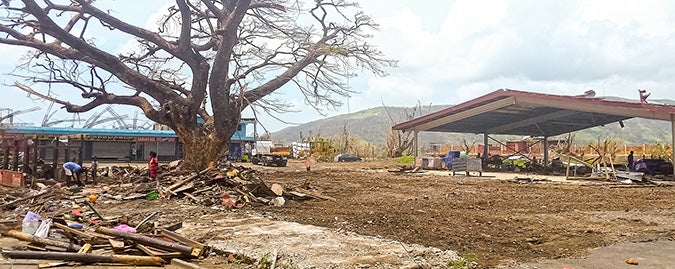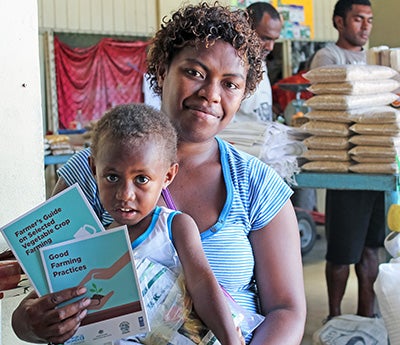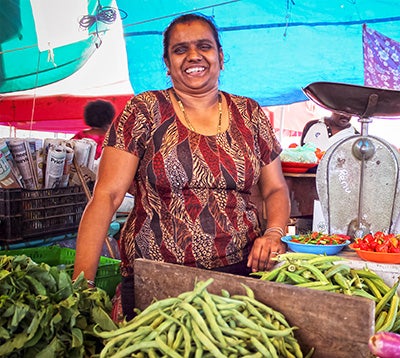In Fiji’s markets, hopes are growing a year after a devastating cyclone
Date:
Author: Lauretta Ah Sam
Rakiraki, Fiji — A year on, Varanisese Maisamoa is still frightened whenever the wind rises.

“When I feel the wind blow very strong, I get scared, and I have to remind myself that it’s just the wind,” she said. “But cyclones will come and go, and people learn how to survive. And that’s what we did - that’s how we learn to be resilient."
Ms. Maisamoa was among the tens of thousands of Fijians who had to rebuild their livelihoods after Tropical Cyclone Winston pounded the country a year ago. During its height on 20 February, the storm unleashed 230-km-per-hour winds and heavy rain and flooding that devastated entire villages and communities, crops and farmlands. More than 30,000 houses and several hundred schools and medical facilities were damaged or destroyed, government figures show. Forty-four people were killed, thousands displaced, and 40,000 people needed immediate assistance.
Ms. Maisamoa’s family house was among those destroyed. Progress on rebuilding it was hampered because hardware supplies were scarce as a result of high demand after the disaster. Ms. Maisamoa, 38, is a farmer, market vendor and President of the Rakiraki Market Vendors Association. She sells fish, cooked food, root crops and fruit, and has been selling at Rakiraki Market for 11 years. She lives with her husband and six children.

The original building at Rakiraki Market had stood for about four decades until the cyclone. The central produce hall used by the vegetable vendors and the newly-built accommodation centre for female vendors were both destroyed. With funding from the Government of Australia, UN Women erected tents and supplied tables and chairs so the vendors could return to Rakiraki and nine other Fiji markets that were the most affected. Work to rebuild Rakiraki Market will be completed in 12 months, an initiative supported by the Government of Australia through UN Women’s Markets for Change project.
In the aftermath of the cyclone, vendors and the farmers who supply them rolled up their sleeves and carried on. Homes were rebuilt, crops replanted and farmers worked together to restock agricultural produce and breathe life back into Rakiraki Market stalls. Again with funding from the Government of Australia, UN Women helped by distributing vegetable seeds, fertilizer, insecticide and basic farming tools in collaboration with the Fiji Government. This benefited over 1,580 of the worst-affected vendor- farmers across the country.
Litia Timai, 28, was among those who made good use of the agricultural supplies. She and her husband grow tomatoes, chillies, beans, cassava, sweet potatoes and cucumbers and supply their produce to Rakiraki and Suva Markets."I'm happy to be a woman farmer because sometimes our husbands are lazy, but we women can do things by ourselves. A month after Winston we started to plant again," she said.
UN Women’s Fiji Multi-Country Office Representative, Aleta Miller, said that “assisting women vendor-farmers to quickly return to their income-generating activities is critical as women dominate marketplaces, and many lose their only source of income when market sites are not operating to their full potential.”
UN Women also helped 817 vendor-farmers across seven markets and four communities get training on farm management, soil care, plant nutrients, marketing, harvest- and post-harvest handling. The trainings were made possible through a partnership among UN Women, Fiji National University, United Nations Development Programme and the Fiji Ministry of Agriculture.

Sunila Wati, a 53-year-old Rakiraki vendor and farmer, received the agricultural supplies and attended five training sessions. “I planted the seeds that I received,” she said. “The leftover seeds I have shared with another farmer who also supplies to me in the market.”
Women make up 75 to 90 per cent of the market vendors in the Pacific. The Markets for Change project works to increase the vendors’ social and economic security, and works with local governments to support women's involvement in managing the markets and to ensure that the environment is safe and accommodating for female vendors.
For further information:
Please contact (Ms.) Lauretta Ah Sam
Communications and Media Specialist,
UN Women Fiji Multi-Country Office
Tel: +679 330 1178 Ext: 145, Cell: +679 999 1745
Email: lauretta...@unwomen.org